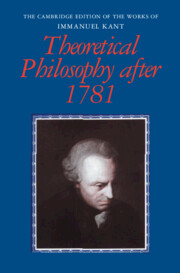Book contents
- Frontmatter
- Contents
- General editors' preface
- General introduction
- Prolegomena to any future metaphysics that will be able to come forward as science (1783)
- Metaphysical foundations of natural science (1786)
- On a discovery whereby any new critique of pure reason is to be made superfluous by an older one (1790)
- What real progress has metaphysics made in Germany since the time of Leibniz and Wolff? (1793/1804)
- On a recently prominent tone of superiority in philosophy (1796)
- Settlement of a mathematical dispute founded on misunderstanding (1796)
- Proclamation of the imminent conclusion of a treaty of perpetual peace in philosophy (1796)
- Editorial notes
- Glossary
- Index of names
- Index of subjects
On a recently prominent tone of superiority in philosophy (1796)
Published online by Cambridge University Press: 29 July 2009
- Frontmatter
- Contents
- General editors' preface
- General introduction
- Prolegomena to any future metaphysics that will be able to come forward as science (1783)
- Metaphysical foundations of natural science (1786)
- On a discovery whereby any new critique of pure reason is to be made superfluous by an older one (1790)
- What real progress has metaphysics made in Germany since the time of Leibniz and Wolff? (1793/1804)
- On a recently prominent tone of superiority in philosophy (1796)
- Settlement of a mathematical dispute founded on misunderstanding (1796)
- Proclamation of the imminent conclusion of a treaty of perpetual peace in philosophy (1796)
- Editorial notes
- Glossary
- Index of names
- Index of subjects
Summary
Von einem neuerdings erhobenen vornehmen Ton in der Philosophie was first published in May, 1796, in the Berlinische Monatsschrift 27, 387–426. It was the opening shot in a controversy that later drew in a number of other writers, and to which Kant was to contribute a second essay: Verkündigung des nahen Abschlusses eines Traktats zum ewigen Frieden in der Philosophie, which appeared in December of that year (BM 28, 485–504). In the meantime, a side-dispute had also broken out with the mathematician J. A. H. Reimarus, over an allusion to Pythagorean triangles in the first essay; it led Kant to pen a brief explanation: Ausgleichung eines auf Missverstand beruhenden mathematischen Streits, which was printed in the August, 1796, number of the same journal. It had nothing to do with the main issues in contention, and in some editions of Kant's works has become detached from its context, to lead a separate existence of its own. It has here been inserted in its proper place.
Kant's attack on fine airs in philosophy, and the “proclamation of peace” that succeeded it, are primarily directed at the writings of Johann Georg Schlosser, a retired administrator and gentleman-amateur in philosophy, who happened also to be Goethe's brother-in-law. Having published, in 1795, a translation of Plato's letters, Schlosser had joined forces with another amateur Platonist, translator, and poetical light of the Göttinger Dichterbund, Count Friedrich Leopold zu Stolberg (1750–1819).
- Type
- Chapter
- Information
- Theoretical Philosophy after 1781 , pp. 425 - 446Publisher: Cambridge University PressPrint publication year: 2002
- 9
- Cited by

